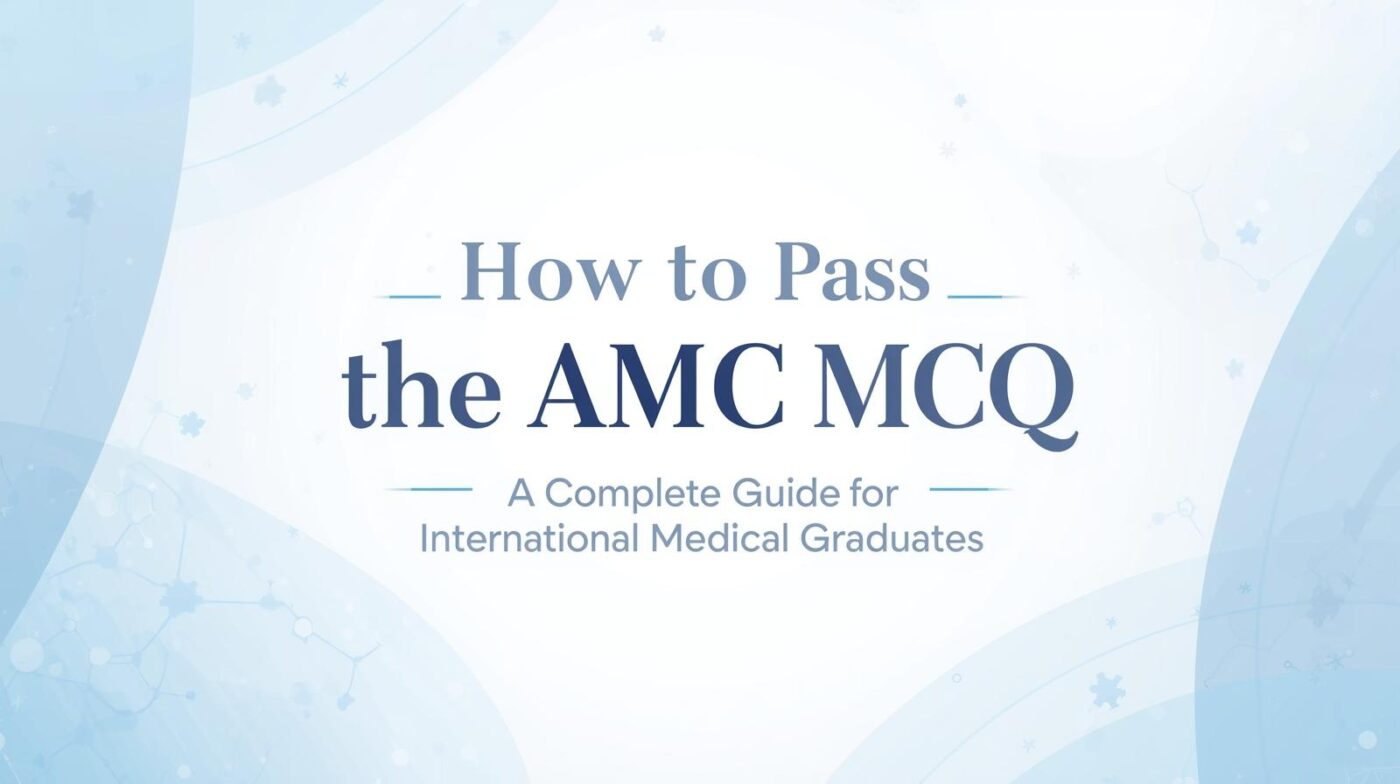Registration & Pathways
How to Pass the AMC MCQ Exam: A Complete Guide for IMGs
For international medical graduates (IMGs) without a specialist qualification, the Standard Pathway is the main route to practicing medicine in Australia.
The term “pathway” refers to the set of steps required for medical registration with AHPRA (the Australian Health Practitioner Regulation Agency).
There are two main routes — one for those who already hold a recognized specialist qualification, and one for those who do not. This article focuses on the latter.
Under the Standard Pathway, IMGs must complete the following requirements:
- English Language Skills Registration Standard
- AMC MCQ (Multiple Choice Questions Exam)
- AMC Clinical Examination or Workplace-Based Assessment (WBA)
Before anything else, candidates must demonstrate sufficient English proficiency for clinical work. This can be done through one of the approved tests — OET, IELTS (Academic), TOEFL iBT, or PTE Academic — by meeting the benchmark scores defined in AHPRA’s English Language Skills Registration Standard.
After passing the English requirement, the next steps are the AMC MCQ and AMC Clinical Examination, both conducted by the Australian Medical Council (AMC). The Clinical Examination may now be taken online or in person (for example, at the Melbourne National Test Centre).
This article provides a detailed look at how to prepare for the AMC MCQ exam.
Overview of the AMC MCQ
The AMC MCQ is a computer-based adaptive test (CAT) designed to assess medical knowledge within the context of Australian healthcare.
Exam summary
- Name: AMC MCQ (Multiple Choice Questions)
- Format: Five-option multiple-choice questions
- Number of questions: 150
- Duration: 210 minutes (3 hours 30 minutes)
- Scope: Diagnostic reasoning, clinical management, and ethics across the major clinical domains
- Application: Requires creation of an AMC Account (approximately AUD 642, subject to change)
The exam covers the following broad domains:
- Adult Health – Medicine / Surgery
- Women’s Health – Obstetrics & Gynaecology
- Child Health
- Mental Health
- Population Health & Ethics
Main Preparation Methods for the AMC MCQ
There are four main ways to prepare for the AMC MCQ:
- Official study materials
- Online resources
- Preparation schools
- Other supplementary materials
Each approach has its own strengths and weaknesses.
1. Official Materials and Resources
The AMC recommends several resources that comprehensively cover the exam content and structure.
Key materials include:
- The AMC Handbook of Multiple Choice Questions
- AMC MCQ Preparation App (linked with eMedici, free, regularly updated)
The exam not only tests medical knowledge but also reading comprehension and vocabulary. Working through official materials helps build these foundational skills.
A limitation, however, is that printed materials such as the AMC Handbook can be somewhat outdated.
They are excellent for understanding the format, but may not fully reflect current question styles. Always cross-check with the latest MCQ Specifications on the AMC website.
2. Online Preparation (Question Banks)
Online question banks allow candidates to practice with a large number of sample questions over a set subscription period.
Popular platforms include:
- Mplusx QBank
- AMEDEX
These platforms are ideal for improving speed and pattern recognition through repetition. However, because some content may not originate directly from AMC materials, the quality and accuracy of questions can vary.
It’s best to use them as supplementary practice, while keeping your study aligned with AMC’s official structure and competencies.
3. Preparation Schools
Several training institutions run AMC preparation programs for international medical graduates. These courses are often taught in English and offer a structured study schedule alongside peers from around the world.
Common examples include:
- HEAL
- ARIMGSAS
These schools can be helpful if you want an interactive learning environment and the discipline of fixed schedules. However, because MCQ success largely depends on self-study and memorization, progress may feel slow at times.
Many institutions host free webinars, which can be a great way to gauge whether their approach fits your needs.
4. Other Resources
Because the AMC MCQ covers general clinical knowledge, a variety of standard medical textbooks can also support your preparation.
Useful references include:
- Murtagh’s General Practice
- First Aid for the USMLE Step 2 CK
These books are effective for building background knowledge and filling gaps in weaker areas. However, since they are not directly aligned with the AMC MCQ syllabus, they should be used as supplementary reading rather than the main preparation source.
Summary
The AMC MCQ consists of 150 multiple-choice questions over 210 minutes, assessing your ability to apply medical knowledge in clinical scenarios. Success in the exam relies primarily on two key skills:
- Strong medical vocabulary
- Broad background knowledge across specialties
Accurate reading and reasoning are crucial — and these skills require time and steady exposure to English medical texts.
Build a long-term study plan, balancing official AMC materials, online practice, and targeted content review.
With consistency and structured preparation, IMGs can significantly improve their performance and move one step closer to registration in Australia.
Study with OET BANK
Stop wasting time comparing OET materials.
With OET BANK, you get:
- Premium-quality OET materials, built by professionals
- A focused, efficient study path — no unnecessary content
- A system designed to help you pass OET once — without trial and error
If you want to prepare properly and pass with confidence,
you don’t need to look anywhere else.
Pick your materials and start today — with OET BANK.

References:
- https://www.amc.org.au/
- https://yoshitoandmarie.com/blogs/content-20230624/
- https://doctor-fksk.com/amc-mcq/
- https://k-doc.hatenablog.com/entry/2022/08/16/163553



